What I Talk About When I Talk About Running vs. After the Quake
What I Talk About When I Talk About Running
What I Talk About When I Talk About Running is a memoir by Haruki Murakami where he talks about two things that define a big part of his life: running and writing. Murakami didn’t always plan on being a novelist. He was running a jazz bar in his twenties when, while watching a baseball game, he suddenly thought, “I could write a novel.” He gave it a shot, it worked out, and he eventually sold his bar to focus on writing full-time. But sitting at a desk all day, smoking and not moving much, wasn’t doing his health any good. That’s when he picked up running. For Murakami, running is more than just exercise—it’s part of his routine and, in a way, a metaphor for writing. Both take endurance. Both are long hauls where you push yourself day after day, even when you don’t feel like it. The book follows him as he trains for marathons, competes in triathlons, and grapples with the slow decline of his physical abilities as he ages. He talks a lot about acceptance—accepting getting older, accept...
After the Quake
An electronics salesman who has been deserted by his wife agrees to deliver an enigmatic package— and is rewarded with a glimpse of his true nature. A man who views himself as the son of God pursues a stranger who may be his human father. A mild-mannered collection agent receives a visit from a giant talking frog who enlists his help in saving Tokyo from destruction. The six stories in this collection come from the deep and mysterious place where the human meets the inhuman—and are further proof that Murakami is one of the most visionary writers at work today.

Reviews
Reviewed on 2/28/2024
I read this book when I first started running long distance. I was living in Chiang Mai and I'd go this huge park a couple of times a week and just run loops around the lake. At the end of my run I'd grab a milk tea and a banana bread from a local coffee shop and just read a few pages. Great memories of many chill evenings, running and reading about running.
Reviews
| Item | Votes | Upvote |
|---|---|---|
| Easy read | 1 | |
| Motivating | 1 | |
| Peaceful | 1 |
| Item | Votes | Upvote |
|---|---|---|
| No cons yet, would you like to add one? | ||
| Item | Votes | Upvote |
|---|---|---|
| No pros yet, would you like to add one? | ||
| Item | Votes | Upvote |
|---|---|---|
| No cons yet, would you like to add one? | ||
Frequently Asked Questions
'What I Talk About When I Talk About Running' is focused on personal reflection, exploring themes of running, aging, and the creative process. It offers an intimate look into Haruki Murakami's life and thoughts, making it ideal for readers who enjoy memoirs and personal essays. In contrast, 'After the Quake' is a collection of fictional stories that delve into surreal and philosophical themes, which may appeal more to readers interested in imaginative narratives rather than personal reflection. Therefore, if you prefer introspective writing, 'What I Talk About When I Talk About Running' would be the better choice.
'What I Talk About When I Talk About Running' is written in a conversational and accessible style, making it an engaging read for those interested in Murakami's personal experiences and thoughts. The narrative flows like a diary, which can resonate well with readers looking for a relatable and motivating story. On the other hand, 'After the Quake' features a collection of stories that may require more effort to engage with due to their surreal and complex themes. Thus, for readers seeking a straightforward and engaging narrative, 'What I Talk About When I Talk About Running' is likely the better option.
'What I Talk About When I Talk About Running' is explicitly motivational, as it discusses the author's journey with running and how it influences his life and creativity. Readers often find inspiration in Murakami's reflections on perseverance and personal growth. In contrast, 'After the Quake' does not focus on motivation but rather explores deeper philosophical questions through its fictional narratives. Therefore, if motivation is what you're seeking, 'What I Talk About When I Talk About Running' is the more suitable choice.
'What I Talk About When I Talk About Running' is a memoir by Haruki Murakami that explores the intertwined themes of running and writing. Murakami shares his journey from running a jazz bar to becoming a novelist, detailing how running became a crucial part of his life and a metaphor for his writing process. The book reflects on endurance, acceptance of aging, and the highs and lows of both running and writing.
Pros of 'What I Talk About When I Talk About Running' include its easy readability, motivating content, and the peaceful tone of Murakami's writing. There are no cons listed for this book, indicating that readers generally find it to be a positive experience.
Haruki Murakami is a renowned Japanese author known for his unique blend of magical realism, surrealism, and themes of loneliness and existentialism. He gained international fame with novels such as 'Norwegian Wood' and 'Kafka on the Shore.' In 'What I Talk About When I Talk About Running,' he shares personal insights into his life as a writer and runner.
The writing style of 'What I Talk About When I Talk About Running' is straightforward and conversational, as if Murakami is sharing his thoughts over coffee. He often includes personal anecdotes and reflections, making the narrative relatable and engaging for readers.
In 'What I Talk About When I Talk About Running,' memorable moments include Murakami's experiences training for marathons, his reflections on aging and acceptance, and the simple joys of running, such as the satisfaction of finishing a race and enjoying a cold beer afterward. His vivid descriptions of running the original marathon route in Greece also stand out.
'After the Quake' is a collection of six short stories by Haruki Murakami. The stories revolve around characters dealing with the aftermath of the Kobe earthquake. An electronics salesman who has been deserted by his wife agrees to deliver an enigmatic package; a man who believes he is the son of God pursues a stranger who may be his human father; and a mild-mannered collection agent receives a visit from a giant talking frog who enlists his help in saving Tokyo from destruction. These stories explore the deep and mysterious intersection of the human and the inhuman.
'After the Quake' is authored by Haruki Murakami, a renowned Japanese writer known for his unique blend of surrealism, magical realism, and contemporary themes. He is one of the most visionary writers at work today.
The main themes in 'After the Quake' include human vulnerability, the impact of natural disasters, existentialism, and the intersection between the human and the inhuman. Murakami explores how these events shape the characters' lives and their perceptions of reality.
'After the Quake' belongs to the genres of literary fiction and magical realism. The stories often contain surreal and fantastical elements that blur the lines between reality and imagination.




















